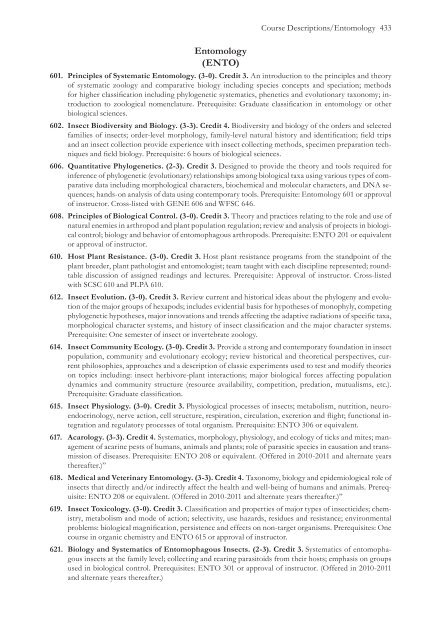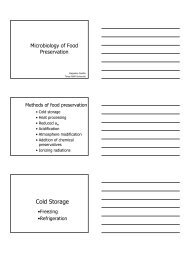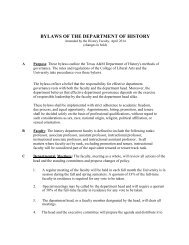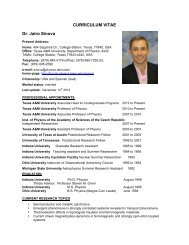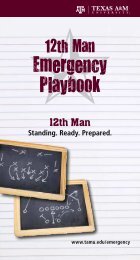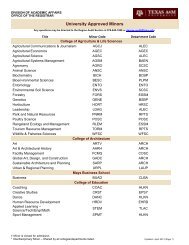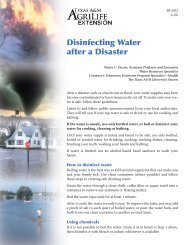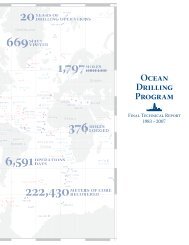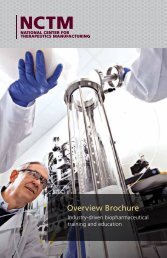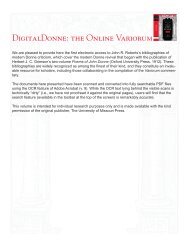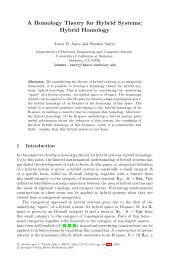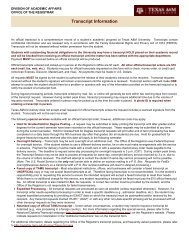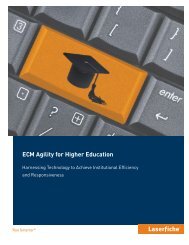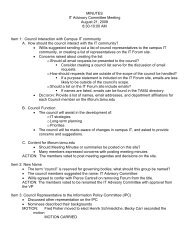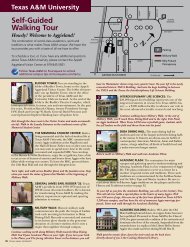- Page 2 and 3:
2AccreditationTexas A&M University
- Page 4 and 5:
4Academic Calendar2013 Summer Term
- Page 6 and 7:
6May 2, 5-7May 8May 9May 9-10May 12
- Page 8 and 9:
8Board of RegentsPhil Adams, Chairm
- Page 10 and 11:
10Office of Graduate and Profession
- Page 12 and 13:
12LIBERAL ARTSPatricia A. Hurley, C
- Page 14 and 15:
14University Student RulesEach stud
- Page 16 and 17:
.16ContentsHistory and Development.
- Page 20 and 21:
20Student Learning OutcomesStudent
- Page 22 and 23:
22Office of Graduate andProfessiona
- Page 24 and 25:
24 Office of Graduate and Professio
- Page 26 and 27:
26 Office of Graduate and Professio
- Page 28 and 29:
28 Office of Graduate and Professio
- Page 30 and 31:
30 Office of Graduate and Professio
- Page 32 and 33:
32Degree InformationExpectations fo
- Page 34 and 35:
34 Degree InformationResidence Requ
- Page 36 and 37:
36 Degree Informationtual property
- Page 38 and 39:
38 Degree InformationA student may
- Page 40 and 41:
40 Degree InformationTranscripted G
- Page 42 and 43:
42 Degree Informationcance to the A
- Page 44 and 45:
44 Degree InformationConservation T
- Page 46 and 47:
46 Degree Informationstudents can c
- Page 48 and 49:
48 Degree InformationThe Graduate C
- Page 50 and 51:
50 Degree Informationyears employme
- Page 52 and 53:
52 Degree InformationGraduate Certi
- Page 54 and 55:
54 Degree InformationCertificate in
- Page 56 and 57:
56 Degree InformationUndergraduate
- Page 58 and 59:
58 Degree InformationCollege of Agr
- Page 60 and 61:
60 Degree InformationDwight Look Co
- Page 62 and 63:
62 Degree InformationCollege of Vet
- Page 64 and 65:
64 Degree Information/The Degree of
- Page 66 and 67:
66 Degree Information/The Degree of
- Page 68 and 69:
68 Degree Information/The Degree of
- Page 70 and 71:
70 Degree Information/Steps to Fulf
- Page 72 and 73:
72 Degree Information/The Degree of
- Page 74 and 75:
74 Degree Information/The Degree of
- Page 76 and 77:
76 Degree Information/The Degree of
- Page 78 and 79:
78 Degree Information/The Degree of
- Page 80 and 81:
80 Degree Information/The Degree of
- Page 82 and 83:
82 Degree Information/The Degree of
- Page 84 and 85:
84 Degree Information/The Degree of
- Page 86 and 87:
86 Degree Information/The Degree of
- Page 88 and 89:
88 Degree Information/The Degree of
- Page 90 and 91:
90 Degree Information/The Degree of
- Page 92 and 93:
92 Degree Information/The Degree of
- Page 94 and 95:
94 Degree Information/The Degree of
- Page 96 and 97:
96 Degree Information/The Degree of
- Page 98 and 99:
98 Degree Information/The Degree of
- Page 100 and 101:
100 Degree Information/The Degree o
- Page 102 and 103:
102 Degree Information/The Degree o
- Page 104 and 105:
104 Degree Information/The Degree o
- Page 106 and 107:
106 Degree Information/The Degree o
- Page 108 and 109:
108 Degree Information/The Degree o
- Page 110 and 111:
110 Degree Information/The Degree o
- Page 112 and 113:
112 Degree Information/The Degree o
- Page 114 and 115:
114 Degree Information/The Degree o
- Page 116 and 117:
116 Degree Information/The Degree o
- Page 118 and 119:
118 Degree Information/The Degree o
- Page 120 and 121:
120 Degree Information/The Degree o
- Page 122 and 123:
122 Degree Information/The Degree o
- Page 124 and 125:
124 Degree Information/The Degree o
- Page 126 and 127:
126 Degree Information/The Degree o
- Page 128 and 129:
128 Degree Information/The Degree o
- Page 130 and 131:
130 Degree Information/The Degree o
- Page 132 and 133:
132 Degree Information/The Degree o
- Page 134 and 135:
134 Degree Information/The Degree o
- Page 136 and 137:
136 Degree Information/The Degree o
- Page 138 and 139:
138 Degree Information/The Degree o
- Page 140 and 141:
140 Degree Information/The Degree o
- Page 142 and 143:
142 Degree Information/The Degree o
- Page 144 and 145:
144 Degree Information/The Degree o
- Page 146 and 147:
146 Degree Information/The Degree o
- Page 148 and 149:
148 Degree Information/The Degree o
- Page 150 and 151:
150 Degree Information/The Degree o
- Page 152 and 153:
152 Degree Information/The Degree o
- Page 154 and 155:
154 Degree Information/The Degree o
- Page 156 and 157:
156 Degree Information/The Degree o
- Page 158 and 159:
158 Degree Information/The Degree o
- Page 160 and 161:
160 Degree Information/The Degree o
- Page 162 and 163:
162 Degree Information/The Degree o
- Page 164 and 165:
164 Degree Information/The Degree o
- Page 166 and 167:
166 Degree Information/The Degree o
- Page 168 and 169:
168 Degree Information/The Degree o
- Page 170 and 171:
170 Degree Information/The Degree o
- Page 172 and 173:
172 Degree Information/The Degree o
- Page 174 and 175:
174 Degree Information/The Degree o
- Page 176 and 177:
176 Degree Information/The Degree o
- Page 178 and 179:
178 Degree Information/The Degree o
- Page 180 and 181:
180 Degree Information/The Degree o
- Page 182 and 183:
182 Degree Information/The Degree o
- Page 184 and 185:
184 Degree Information/The Degree o
- Page 186 and 187:
186 Degree Information/The Degree o
- Page 188 and 189:
188 Degree Information/The Degree o
- Page 190 and 191:
190 Degree Information/The Degree o
- Page 192 and 193:
192 Degree Information/The Degree o
- Page 194 and 195:
194 Degree Information/The Degree o
- Page 196 and 197:
196 Degree Information/The Degree o
- Page 198 and 199:
198 Degree Information/The Degree o
- Page 200 and 201:
200 Degree Information/The Degree o
- Page 202 and 203:
202 AdmissionRegular Admission Stat
- Page 204 and 205:
204 AdmissionPostbaccalaureate Non-
- Page 206 and 207:
206 AdmissionEnglish Language Profi
- Page 208 and 209:
208 Registration andAcademic Status
- Page 210 and 211:
210 Registration andAcademic Status
- Page 212 and 213:
212 Registration andAcademic Status
- Page 214 and 215:
214 Tuition, Fees and Other Financi
- Page 216 and 217:
216 Tuition, Fees and Other Financi
- Page 218 and 219:
218 Tuition, Fees and Other Financi
- Page 220 and 221:
220 Tuition, Fees and Other Financi
- Page 222 and 223:
222 Tuition, Fees and Other Financi
- Page 224 and 225:
224 Tuition, Fees and Other Financi
- Page 226 and 227:
226 Tuition, Fees and Other Financi
- Page 228 and 229:
228 Tuition, Fees and Other Financi
- Page 230 and 231:
230 Tuition, Fees and Other Financi
- Page 232 and 233:
232Aggie Honor System Officeaggieho
- Page 234 and 235:
234Resources for StudentsAlcohol an
- Page 236 and 237:
236 Resources for StudentsGeorge Bu
- Page 238 and 239:
238 Resources for StudentsRecreatio
- Page 240 and 241:
240 Resources for StudentsStudent L
- Page 242 and 243:
242 Resources for StudentsVice Pres
- Page 244 and 245:
244Student Options AbroadInternatio
- Page 246 and 247:
246 International Opportunities for
- Page 248 and 249:
248College of Veterinary Medicine&
- Page 250 and 251:
250 College of Veterinary Medicine
- Page 252 and 253:
252 College of Veterinary Medicine
- Page 254 and 255:
254 College of Veterinary Medicine
- Page 256 and 257:
256Texas A&MHealth Science CenterAd
- Page 258 and 259:
258 Texas A&MHealth Science Center6
- Page 260 and 261:
260 Texas A&MHealth Science Center6
- Page 262 and 263:
262 Texas A&MHealth Science CenterS
- Page 264 and 265:
264 Texas A&MHealth Science Center6
- Page 266 and 267:
266 Texas A&MHealth Science Center6
- Page 268 and 269:
268 Texas A&MHealth Science Center6
- Page 270 and 271:
270 Texas A&MHealth Science Center6
- Page 272 and 273:
272 Texas A&MHealth Science Center6
- Page 274 and 275:
274 Texas A&MHealth Science CenterS
- Page 276 and 277:
276Texas A&M Universityat Galveston
- Page 278 and 279:
278 Texas A&M University at Galvest
- Page 280 and 281:
280 Texas A&M University at Galvest
- Page 282 and 283:
282 Texas A&M University at Galvest
- Page 284 and 285:
284 Texas A&M University at Galvest
- Page 286 and 287:
286 Texas A&M University at Galvest
- Page 288 and 289:
288 Texas A&M University at Galvest
- Page 290 and 291:
290 Texas A&M University at Galvest
- Page 292 and 293:
292 Texas A&M University at Galvest
- Page 294 and 295:
294 Texas A&M University at Galvest
- Page 296 and 297:
296 Texas A&M University at Galvest
- Page 298 and 299:
298 Texas A&M University at Galvest
- Page 300 and 301:
300 Texas A&M University at Galvest
- Page 302 and 303:
302 Texas A&M University at Galvest
- Page 304 and 305:
304 Texas A&M University at Galvest
- Page 306 and 307:
306 Texas A&M University at Galvest
- Page 308 and 309:
308 Texas A&M University at Galvest
- Page 310 and 311:
310Texas A&M University at QatarAdm
- Page 312 and 313:
312 Texas A&M University at QatarFa
- Page 314 and 315:
314 Texas A&M University at Qatar66
- Page 316 and 317:
316 Texas A&M University at QatarKa
- Page 318 and 319:
318 Course Descriptions/AccountingC
- Page 320 and 321:
320 Course Descriptions/Accounting6
- Page 322 and 323:
322 Course Descriptions/Aerospace E
- Page 324 and 325:
324 Course Descriptions/Aerospace E
- Page 326 and 327:
326 Course Descriptions/Agribusines
- Page 328 and 329:
328 Course Descriptions/Agricultura
- Page 330 and 331:
330 Course Descriptions/Agricultura
- Page 332 and 333:
332 Course Descriptions/Agricultura
- Page 334 and 335:
334 Course Descriptions/Animal Scie
- Page 336 and 337:
336 Course Descriptions/Anthropolog
- Page 338 and 339:
338 Course Descriptions/Anthropolog
- Page 340 and 341:
340 Course Descriptions/Anthropolog
- Page 342 and 343:
342 Course Descriptions/Architectur
- Page 344 and 345:
344 Course Descriptions/Architectur
- Page 346 and 347:
346 Course Descriptions/Architectur
- Page 348 and 349:
348 Course Descriptions/Athletic Tr
- Page 350 and 351:
350 Course Descriptions/Atmospheric
- Page 352 and 353:
352 Course Descriptions/Biochemistr
- Page 354 and 355:
354 Course Descriptions/Biological
- Page 356 and 357:
356 Course Descriptions/Biological
- Page 358 and 359:
358 Course Descriptions/Biology606.
- Page 360 and 361:
360 Course Descriptions/BiophysicsB
- Page 362 and 363:
362 Course Descriptions/Biomedical
- Page 364 and 365:
364 Course Descriptions/Biotechnolo
- Page 366 and 367:
366 Course Descriptions/The Bush Sc
- Page 368 and 369:
368 Course Descriptions/Chemical En
- Page 370 and 371:
370 Course Descriptions/Chemical En
- Page 372 and 373:
372 Course Descriptions/Chemistry61
- Page 374 and 375:
374 Course Descriptions/Chemistry69
- Page 376 and 377:
376 Course Descriptions/Civil Engin
- Page 378 and 379:
378 Course Descriptions/Civil Engin
- Page 380 and 381:
380 Course Descriptions/Civil Engin
- Page 382 and 383: 382 Course Descriptions/ClassicsCla
- Page 384 and 385: 384 Course Descriptions/Communicati
- Page 386 and 387: 386 Course Descriptions/Computer Sc
- Page 388 and 389: 388 Course Descriptions/Computer Sc
- Page 390 and 391: 390 Course Descriptions/Computer Sc
- Page 392 and 393: 392 Course Descriptions/Constructio
- Page 394 and 395: 394 Course Descriptions/Counseling
- Page 396 and 397: 396 Course Descriptions/EconomicsEc
- Page 398 and 399: 398 Course Descriptions/Ecosystem S
- Page 400 and 401: 400 Course Descriptions/Ecosystem S
- Page 402 and 403: 402 Course Descriptions/Educational
- Page 404 and 405: 404 Course Descriptions/Educational
- Page 406 and 407: 406 Course Descriptions/Educational
- Page 408 and 409: 408 Course Descriptions/Educational
- Page 410 and 411: 410 Course Descriptions/Educational
- Page 412 and 413: 412 Course Descriptions/Educational
- Page 414 and 415: 414 Course Descriptions/Educational
- Page 416 and 417: 416 Course Descriptions/Educational
- Page 418 and 419: 418 Course Descriptions/Educational
- Page 420 and 421: 420 Course Descriptions/Educational
- Page 422 and 423: 422 Course Descriptions/Electrical
- Page 424 and 425: 424 Course Descriptions/Electrical
- Page 426 and 427: 426 Course Descriptions/Electrical
- Page 428 and 429: 428 Course Descriptions/Electrical
- Page 430 and 431: 430 Course Descriptions/EnglishEngl
- Page 434 and 435: 434 Course Descriptions/Entomology6
- Page 436 and 437: 436 Course Descriptions/Financerect
- Page 438 and 439: 438 Course Descriptions/Finance674.
- Page 440 and 441: 440 Course Descriptions/Food Scienc
- Page 442 and 443: 442 Course Descriptions/Genetics629
- Page 444 and 445: 444 Course Descriptions/Geography61
- Page 446 and 447: 446 Course Descriptions/Geography68
- Page 448 and 449: 448 Course Descriptions/Geology641.
- Page 450 and 451: 450 Course Descriptions/GeophysicsG
- Page 452 and 453: 452 Course Descriptions/Health and
- Page 454 and 455: 454 Course Descriptions/Health643.
- Page 456 and 457: 456 Course Descriptions/Hispanic St
- Page 458 and 459: 458 Course Descriptions/History615.
- Page 460 and 461: 460 Course Descriptions/History689.
- Page 462 and 463: 462 Course Descriptions/HumanitiesH
- Page 464 and 465: 464 Course Descriptions/Industrial
- Page 466 and 467: 466 Course Descriptions/Industrial
- Page 468 and 469: 468 Course Descriptions/Information
- Page 470 and 471: 470 Course Descriptions/Information
- Page 472 and 473: 472 Course Descriptions/Internation
- Page 474 and 475: 474 Course Descriptions/Internation
- Page 476 and 477: 476 Course Descriptions/Internation
- Page 478 and 479: 478 Course Descriptions/Kinesiology
- Page 480 and 481: 480 Course Descriptions/Landscape A
- Page 482 and 483:
482 Course Descriptions/Landscape A
- Page 484 and 485:
484 Course Descriptions/Management6
- Page 486 and 487:
486 Course Descriptions/Management6
- Page 488 and 489:
488 Course Descriptions/Marketing62
- Page 490 and 491:
490 Course Descriptions/Materials S
- Page 492 and 493:
492 Course Descriptions/Materials S
- Page 494 and 495:
494 Course Descriptions/Mathematics
- Page 496 and 497:
496 Course Descriptions/Mathematics
- Page 498 and 499:
498 Course Descriptions/Mathematics
- Page 500 and 501:
500 Course Descriptions/Mechanical
- Page 502 and 503:
502 Course Descriptions/Mechanical
- Page 504 and 505:
504 Course Descriptions/Mechanical
- Page 506 and 507:
506 Course Descriptions/Mechanics a
- Page 508 and 509:
508 Course Descriptions/Molecular a
- Page 510 and 511:
510 Course Descriptions/Neuroscienc
- Page 512 and 513:
512 Course Descriptions/Nuclear Eng
- Page 514 and 515:
514 Course Descriptions/Nuclear Eng
- Page 516 and 517:
516 Course Descriptions/NutritionDe
- Page 518 and 519:
518 Course Descriptions/Ocean Engin
- Page 520 and 521:
520 Course Descriptions/Oceanograph
- Page 522 and 523:
522 Course Descriptions/Oceanograph
- Page 524 and 525:
524 Course Descriptions/Performance
- Page 526 and 527:
526 Course Descriptions/Petroleum E
- Page 528 and 529:
528 Course Descriptions/Petroleum E
- Page 530 and 531:
530 Course Descriptions/PhilosophyP
- Page 532 and 533:
532 Course Descriptions/PhysicsA Ph
- Page 534 and 535:
534 Course Descriptions/Physics644.
- Page 536 and 537:
536 Course Descriptions/Plant Patho
- Page 538 and 539:
538 Course Descriptions/Political S
- Page 540 and 541:
540 Course Descriptions/Poultry Sci
- Page 542 and 543:
542 Course Descriptions/PsychologyP
- Page 544 and 545:
544 Course Descriptions/Psychology6
- Page 546 and 547:
546 Course Descriptions/Public Serv
- Page 548 and 549:
548 Course Descriptions/Public Serv
- Page 550 and 551:
550 Course Descriptions/Recreation,
- Page 552 and 553:
552 Course Descriptions/Recreation,
- Page 554 and 555:
554 Course Descriptions/Safety Engi
- Page 556 and 557:
556 Course Descriptions/School Psyc
- Page 558 and 559:
558 Course Descriptions/Sociology62
- Page 560 and 561:
560 Course Descriptions/Soil and Cr
- Page 562 and 563:
562 Course Descriptions/Soil and Cr
- Page 564 and 565:
564 Course Descriptions/Special Edu
- Page 566 and 567:
566 Course Descriptions/Special Edu
- Page 568 and 569:
568 Course Descriptions/Statistics6
- Page 570 and 571:
570 Course Descriptions/Teacher Edu
- Page 572 and 573:
572 Course Descriptions/Urban Plann
- Page 574 and 575:
574 Course Descriptions/Urban Plann
- Page 576 and 577:
576 Course Descriptions/Veterinary
- Page 578 and 579:
578 Course Descriptions/Veterinary
- Page 580 and 581:
580 Course Descriptions/Veterinary
- Page 582 and 583:
582 Course Descriptions/Veterinary
- Page 584 and 585:
584 Course Descriptions/Veterinary
- Page 586 and 587:
586 Course Descriptions/Veterinary
- Page 588 and 589:
588 Course Descriptions/Veterinary
- Page 590 and 591:
590 Course Descriptions/Visualizati
- Page 592 and 593:
592 Course Descriptions/Visualizati
- Page 594 and 595:
594 Course Descriptions/Wildlife an
- Page 596 and 597:
596 Course Descriptions/Wildlife an
- Page 598 and 599:
598 Course Descriptions/Women’s a
- Page 600 and 601:
600Graduate FacultyTexas A&M Univer
- Page 602 and 603:
602 FacultyAlmes, Guy, Adjunct Memb
- Page 604 and 605:
604 FacultyArizpe, Victor, Professo
- Page 606 and 607:
606 FacultyBallard, Bart M., Assist
- Page 608 and 609:
608 FacultyBearfield, Domonic, Asso
- Page 610 and 611:
610 FacultyBhattacharya, Nandini, P
- Page 612 and 613:
612 FacultyBonito, Andrea, Assistan
- Page 614 and 615:
614 FacultyBrinkmeyer-Langford, Can
- Page 616 and 617:
616 FacultyBurlbaw, Lynn M., Profes
- Page 618 and 619:
618 FacultyCarlson, David S., Profe
- Page 620 and 621:
620 FacultyChandra, Ambika, Assista
- Page 622 and 623:
622 FacultyChoudhury, Iftekharuddin
- Page 624 and 625:
624 FacultyConlee, Don T., Instruct
- Page 626 and 627:
626 FacultyCrouch, Elizabeth M., Di
- Page 628 and 629:
628 FacultyDavis, Trina J., Assista
- Page 630 and 631:
630 FacultyDo, Kim-Anh, Adjunct Pro
- Page 632 and 633:
632 FacultyDutta, Bhaskar, Professo
- Page 634 and 635:
634 FacultyElsik, Christine G., Ass
- Page 636 and 637:
636 FacultyFeagin, Joe R., Ella McF
- Page 638 and 639:
638 FacultyFoster, Jamie L., Assist
- Page 640 and 641:
640 FacultyGarcia, Luis Rene, Assoc
- Page 642 and 643:
642 FacultyGill, Rebecca E., Assist
- Page 644 and 645:
644 FacultyGranger, Harris J., Univ
- Page 646 and 647:
646 FacultyGuetersloh, Stephen, Ass
- Page 648 and 649:
648 FacultyHammer, Carolyn J., Adju
- Page 650 and 651:
650 FacultyHascakir, Berna, Assista
- Page 652 and 653:
652 FacultyHess, Kenneth R., Adjunc
- Page 654 and 655:
654 FacultyHons, Frank Michael, Pro
- Page 656 and 657:
656 FacultyHume, Michael E., Resear
- Page 658 and 659:
658 FacultyJacobs, Timothy J., Asso
- Page 660 and 661:
660 FacultyJohnson, Michael D., Ass
- Page 662 and 663:
662 FacultyKattawar, George W., Pro
- Page 664 and 665:
664 FacultyKim, Hoi-eun, Assistant
- Page 666 and 667:
666 FacultyKolomenski, Alexandre A.
- Page 668 and 669:
668 FacultyLacewell, Ronald D., Pro
- Page 670 and 671:
670 FacultyLazarov, Raytcho, Profes
- Page 672 and 673:
672 FacultyLin, Xiaopei, Adjunct Me
- Page 674 and 675:
674 FacultyLopez, Roel R., Professo
- Page 676 and 677:
676 FacultyMahajan, Arvind, Profess
- Page 678 and 679:
678 FacultyMatthews, Nora S., Profe
- Page 680 and 681:
680 FacultyMcKee, David A., Profess
- Page 682 and 683:
682 FacultyMier, Nelda, Associate P
- Page 684 and 685:
684 FacultyMoreno-Centeno, Erick, A
- Page 686 and 687:
686 FacultyMurray, Christine, Instr
- Page 688 and 689:
688 FacultyNguyen, Cam, P.E., Profe
- Page 690 and 691:
690 FacultyOno, Hiroshi, Associate
- Page 692 and 693:
692 FacultyParker, Janet L., Profes
- Page 694 and 695:
694 FacultyPerotto-Baldivieso, Humb
- Page 696 and 697:
696 FacultyPoltoratski, Alexei, Pro
- Page 698 and 699:
698 FacultyQu, Teresa, Lecturer in
- Page 700 and 701:
700 FacultyRead, James C., Professo
- Page 702 and 703:
702 FacultyRiley, David Greg, Assoc
- Page 704 and 705:
704 FacultyRostovtsev, Yuri, Resear
- Page 706 and 707:
706 FacultySalin, Victoria, Associa
- Page 708 and 709:
708 FacultySchielack, Jane F., Prof
- Page 710 and 711:
710 FacultyScully, Marlan O., Unive
- Page 712 and 713:
712 FacultyShi, Weiping, Professor,
- Page 714 and 715:
714 FacultySmee, Delbert Lee, Assis
- Page 716 and 717:
716 FacultySrinivasa, Arun R., Prof
- Page 718 and 719:
718 FacultyStrganac, Thomas W., P.E
- Page 720 and 721:
720 FacultyTai-Seale, Ming, Associa
- Page 722 and 723:
722 FacultyThompson, Jonathan E., A
- Page 724 and 725:
724 FacultyTurner, James Daniel, Ad
- Page 726 and 727:
726 FacultyVieira de Castro, Luis F
- Page 728 and 729:
728 FacultyWalzem, Rosemary L., Pro
- Page 730 and 731:
730 FacultyWeeks, Bradley R., Assoc
- Page 732 and 733:
732 FacultyWiese, Patricia, Clinica
- Page 734 and 735:
734 FacultyWong, P.K.Y., Research S
- Page 736 and 737:
736 FacultyYalvac, Bugrahan, Associ
- Page 738 and 739:
738 FacultyZhang, Dalun, Professor
- Page 740 and 741:
740Appendix ARules and Regulations
- Page 742 and 743:
742 Appendix B/Family Educational R
- Page 744 and 745:
744 Appendix B/Family Educational R
- Page 746 and 747:
746Appendix DJeanne Clery Disclosur
- Page 748 and 749:
748 IndexAAcademic Calendar........
- Page 750 and 751:
750 IndexCooperative Graduate Progr
- Page 752 and 753:
752 IndexGraduate Facultydescriptio
- Page 754 and 755:
754 IndexMaster of ArtsApplication
- Page 756 and 757:
756 IndexFinal Examination.........
- Page 758 and 759:
758 IndexPPathways to the Doctorate
- Page 760 and 761:
760 IndexGeneral Program Informatio


